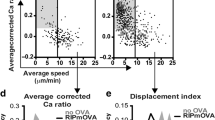Abstract
During embryogenesis, stem cells migrate from the bloodstream into the thymic rudiment where they proliferate and differentiate into T lymphocytes. The epithelial cells of the thymic stroma may influence these processes by providing hormonal and/or contact stimuli to the developing lymphoblasts1,2. Recently, it has been shown that T cells ‘learn’ to recognise the major histocompatability complex (MHC) antigens during thymic lymphopoiesis and become MHC-restricted. Their subsequent response to other antigens can only occur in the context of MHC antigens of the haplotype encountered in the thymus3. Little is known, however, of antigen expression on the thymic stroma which may provide the reference framework on which this MHC restriction is based. In this study we use monoclonal antibodies to show that antigens of the K and I regions of the MHC are detectable on cells of the embryonic mouse thymic stroma from around the 14th day of gestation, just when lymphocyte differentiation is commencing. Furthermore, I-region antigen (Ia antigen) expression is probably limited to thymic epithelium at this stage of gestation and we have not detected Ia on other epithelial tissues of the pharyngeal complex. This pattern of expression is consistent with a role for the thymic stroma in MHC restriction, perhaps by the selection of lymphoid cells for survival on the basis of their recognition of stromal MHC determinants.
This is a preview of subscription content, access via your institution
Access options
Subscribe to this journal
Receive 51 print issues and online access
$199.00 per year
only $3.90 per issue
Buy this article
- Purchase on Springer Link
- Instant access to full article PDF
Prices may be subject to local taxes which are calculated during checkout
Similar content being viewed by others
References
Owen, J. J. T. Int. Rev. Biochem. 22, 1–28 (1979).
Le Douarin, N. M. in Mechanisms of Cell Change (eds Ebert, J. D. & Okada, T. S.) 293–326 (Wiley, New York, 1979).
Zinkernagel, R. M. Immun. Rev. 42, 224–270 (1978).
Raedler, A., Arndt, E., Jablonski, D. & Thiele, H-G. Eur. J. Immun. 8, 728–730 (1979).
Bennink, J. R. & Doherty, P. C. Nature 276, 829–831 (1978).
Waldmann, H., Pope, M., Bettles, C. & Davies, A. J. S. Nature 277, 137–138 (1979).
Wiman, K. et al. Nature 276, 711–713 (1978).
Rous, R. V., van Ewijk, W., Jones, P. P. & Weissman, I. L. J. Immunol. 122, 2508–2515 (1979).
Oi, V. T., Jones, P. P., Coding, J. W., Herzenberg, L. A. & Herzenberg, L. A. Curr. Topics Microbiol. Immun. 81, 115–129 (1978).
Lawton, A. R., Asofsky, R., Hylton, M. B. & Cooper, M. D. J. exp. Med. 277–279 (1972).
Author information
Authors and Affiliations
Rights and permissions
About this article
Cite this article
Jenkinson, E., Owen, J. & Aspinall, R. Lymphocyte differentiation and major histocompatibility complex antigen expression in the embryonic thymus. Nature 284, 177–179 (1980). https://doi.org/10.1038/284177a0
Received:
Accepted:
Issue Date:
DOI: https://doi.org/10.1038/284177a0
This article is cited by
-
Development and characterization of a continuous macrophage cell line, LRTM, derived from thymus of Labeo rohita (Hamilton 1822)
In Vitro Cellular & Developmental Biology - Animal (2014)
-
T cells affect thymic involution during puberty by inducing regression of the adrenal reticularis
The Journal of Physiological Sciences (2012)
-
Differential eicosanoid synthesis by murine fetal thymic non‐lymphoid cells
Immunology & Cell Biology (1992)
-
Absence of growth by most receptor-expressing fetal thymocytes in the presence of interleukin-2
Nature (1985)
-
Differentiation in vitro of Lyt 2+ thymocytes from embryonic Lyt 2− precursors
Nature (1983)
Comments
By submitting a comment you agree to abide by our Terms and Community Guidelines. If you find something abusive or that does not comply with our terms or guidelines please flag it as inappropriate.



